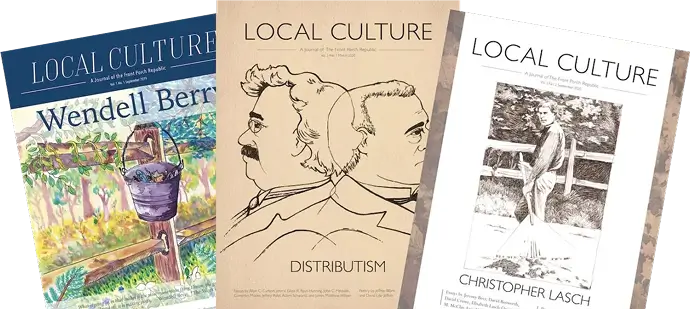Wendell Berry 212
Tanya Berry’s Faithful Art
Women like Tanya bring artistry and honor to everything they touch: the homes they inhabit, the land they steward, the children they raise. These photographs are testimony to the clear,…
The Danger of Hope: Lana Del Rey, Stephen King, and Wendell Berry in the Days of COVID-19
Lana Del Rey. Wendell Berry. Stephen King. Singer-songwriter. Poet-novelist-essayist farmer. Horror writer. What brings these three seemingly disparate artists together in my imagination? Hope.
Clearing Ground
The romantic impulse toward wholeness, or the longing for when things were better—take a few bad turns in that mood, and you find yourself chanting hymns to blood-and-soil. People can…
A Resurrection Story
On May 20, 1945, days after the end of World War II, my mother’s Aunt Anne was shot in both legs by a Communist gunman in Yugoslavia and left for…
Bring Me My Bow of Burning Gold: Micturition and Its Discontents
Why have we persisted in peeing outdoors well after the advent of outhouses and toilets?
Wendell Berry and Zoom
While the futurists and transhumanists and purveyors of educational technologies would have us voluntarily cut off our arms so we can enjoy their fancy new prostheses, our priority should be…
Between Port Royal and Patagonia
Being wealthy doesn’t make Chouinard a better representative of the values that he shares with Berry, but recognizing that Berry is not alone and that these values can be brought…
Remembering After Coronavirus
Shortly after the 2001 terrorist attacks, Wendell Berry wrote, “The time will soon come when we will not be able to remember the horrors of September 11 without remembering also…
Confused and Contented: On Gardening
Gardening is wholly mundane, but in a way that complements our pursuit of holiness and spirituality because it keeps us properly focused and disposed.
Learning about Food and Proper Nouns
Berry moves the conversation from common nouns to proper ones and implicates us all in something deeply practical and doable, yet inexplicably difficult: to love our neighbor, the person right…
Brass Spittoon: Imagining Hope for 2020
Wilfred M. McClay, Bethany Hebbard, and Jake Meador consider what recent trends—considered at the local, regional, and global scales—give reason for hope in 2020.
Noticing Birds
We don’t have to escape to a new and better location with more perfect neighbors. We need to lovingly attend to the ones we have.
Love Is Its Own Justification: Wendell Berry and the Lure of Political Efficacy
Scialabba insists that our actions are meritorious and good if they are effective, if they transform society and lead to measurable improvements. Berry, on the other hand, upholds love as…
Ernest Gaines, 1933-2019
On Tuesday, November 5th, Ernest Gaines, one of the great Southern novelists of the twentieth century, passed away. Gaines had a distinguished and decorated career: his honors include a MacArthur “genius”…
Two Great Interruptions
Wendell Berry’s new story is actually about two great interruptions: the first forms the occasion for Billy’s tale, and the second is how, as the title has it, the tale…
The Foreign Mystique
If we learn about ourselves and our homes through travel, we don’t just become better “citizens of the world”—we can become more conscious and thoughtful citizens of our own places.
Wendell Berry Conference Videos
Video recordings from our 2019 conference on the legacy of Wendell Berry are now online. We hope those of you who weren't able to join us in the flesh will…
The Localist Theory of Charles Marohn’s Wonderfully Practical Strong Towns
[Cross-posted to In Medias Res] This past weekend, I took a group of students up to the annual Prairie Festival at The Land Institute in Salina, KS. I do this…
Learning to Read “the Book in Front of Us”
As the fall semester looms, the minutia of meetings and syllabi revisions threatens to drain the excitement from my impending return to the classroom. As a way of warding off…
A Casual Birder
For most of my adult life I’ve considered myself a birder. Some people say “bird-watcher,” but for me that term conjures up the sort of goofy-looking eccentrics you see in…
On Being Watched, and Remembered
“Don’t take my gun, Nightlife!” Tol called, trying to sound not too much concerned, and yet unable to keep the tone of pleading entirely out of his voice. “I’m liable…
The Yankee Southern Agrarian
Wendell Berry, while still writing more than most of us, is squarely in the awards and laurels stage of his earthly journey. Who will continue the call for sanity and…
Bringing Wendell Berry (and Business) to Sterling
[Cross-posted to In Medias Res] A week ago I was able to organize a small group of friends to attend a fine, relatively intimate event at Sterling College, a small…
The Crisis of Love in a Global Age
Any longtime reader of Wendell Berry’s work recognizes two of the many animating forces that give his writing its emotional resonance. These two forces, these two genii loci, revolve around Berry’s approach…

















